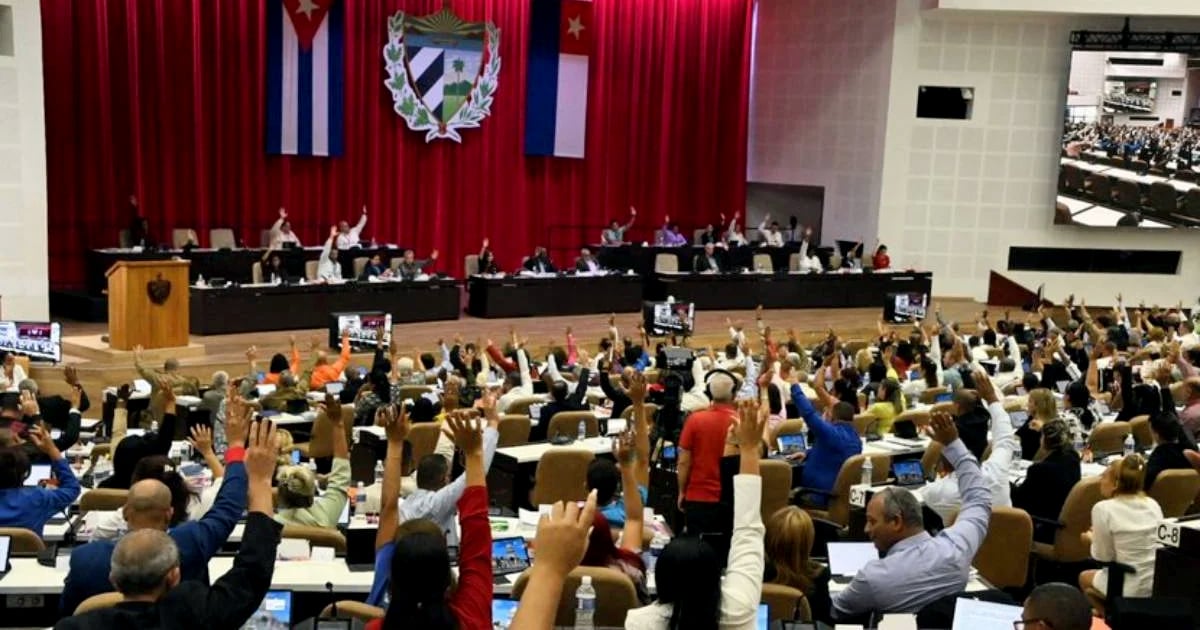The Cuban Parliament's Fourth Ordinary Session of the X Legislature is scheduled from December 18 to 20, as announced by Homero Acosta Álvarez, the Secretary of the National Assembly of People's Power (ANPP) and the Council of State, during a recent appearance on the television program Mesa Redonda. This gathering takes place amid a severe economic crisis characterized by rampant inflation, daily power outages, and growing social unrest. According to Acosta Álvarez, the meeting will tackle topics of national significance, taking into account the concerns and criticisms expressed by the public during municipal meetings for the "delegate's accountability to their constituents."
“We will present an agenda focused on the primary issues affecting the population and the actions the legislative body is undertaking to help resolve them,” stated the official. Acosta Álvarez also mentioned that the Parliament will discuss economic matters, the state budget for 2025, anti-corruption efforts, and follow-up on previous agreements. Additionally, topics like updating the Labor Code, encouraging foreign investment, and implementing a financial banking process will be addressed.
Accountability Process Amidst Crisis
According to the official outlet Cubadebate, the ANPP Secretary claimed that after two years without accountability, delegates nationwide reported back to their constituents with "satisfactory results" in October and November. However, many citizens criticized the process as the usual charade, marked by police presence, low turnout, slogans, and an "energy contingency" that undermined any meaningful accountability.
Acosta Álvarez noted on television that the process unfolded "amid a complex economic situation, exacerbated by the tightening blockade and recent tensions, which resulted in challenges with the National Electric System and natural phenomena impacts."
Independent reports highlighted numerous meeting cancellations and operational limitations. In 2023, sessions were halted due to fuel shortages and organizational issues. In September 2024, the process resumed amidst protests and a persistent energy crisis. Municipal assemblies faced constant interruptions due to technical and logistical problems, some even occurring during blackouts, water supply issues, garbage collection delays, and food distribution setbacks.
The People's March at the End of Sessions
The announcement of the new legislative period occurs amid a dire socio-economic situation. The Cuban economy suffers severe contractions due to declining exports, falling tourism, and reduced remittances. Adding to this is the energy instability causing prolonged blackouts, disrupting the daily lives of millions of Cubans. Despite this, Acosta Álvarez described the illusory accountability process as a "democratic exercise reaffirming Cubans' trust in their political system and legislature."
The country faces rampant inflation, food shortages, soaring prices, and wages set during a now-failed "economic and monetary ordering." The nation is collapsing: a humanitarian disaster unfolds on a picturesque tropical island without public services, with citizens surviving without rights or freedoms, yet supposedly "confident in their political system." A regime crafting such "legitimacy," where "democratic exercises" lead to unanimous endorsements of its "revolutionary order," inevitably concludes ANPP sessions with a People's March, called by Miguel Díaz-Canel to denounce the hostile policies and embargo by the United States, blamed for the country's situation.
Parliament Lacks True Citizen Representation
Since its inception, the National Assembly has served as a tool for the Communist Party of Cuba (PCC) to consolidate state control. There are no free elections or multiparty systems, and all deputies are selected by the regime itself. The so-called "accountability" is viewed as a symbolic exercise, with no real impact on public policy formulation. The uniparty, authoritarian nature of the Cuban regime restricts any possibility of plural debate.
The National Assembly, entirely controlled by the PCC, functions as a mechanism for validating pre-decided government policies, offering no space for genuine civil society representation. In July 2024, Díaz-Canel defended the Parliament's role, claiming unanimous votes result "from long and intense workdays, debate, and consensus-building in the collective interest," a statement challenged by analysts and citizens facing hardship and rights restrictions.
The December sessions will proceed under the watch of a state apparatus controlling every aspect of political and social life in Cuba. The Cuban Parliament will continue to serve as a stage for government validation, detached from the real problems facing the population.
Understanding Cuba's Political and Economic Challenges
What is the main focus of the upcoming Cuban Parliament session?
The upcoming session will focus on addressing issues that significantly impact the nation, including economic challenges, the state budget for 2025, anti-corruption measures, and previous agreements. It will also discuss updates to the Labor Code, foreign investment incentives, and banking processes.
Why is the accountability process in Cuba considered illusory?
The accountability process is seen as illusory because it often lacks genuine public participation and impact. Many view it as a symbolic exercise with predetermined outcomes, characterized by police presence, slogans, and low turnout, diminishing its credibility.
How does the Cuban regime maintain control over the National Assembly?
The Cuban regime maintains control by ensuring the National Assembly operates as a tool of the Communist Party, with no free elections or multiparty systems. Deputies are selected by the regime, limiting any possibility of genuine debate or civil society representation.
